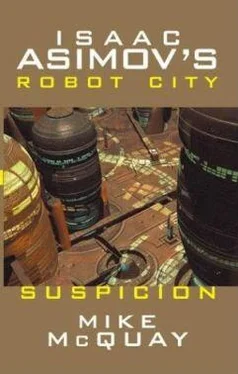Mike McQuay - Suspicion
Здесь есть возможность читать онлайн «Mike McQuay - Suspicion» весь текст электронной книги совершенно бесплатно (целиком полную версию без сокращений). В некоторых случаях можно слушать аудио, скачать через торрент в формате fb2 и присутствует краткое содержание. Город: New York, Год выпуска: 1987, ISBN: 1987, Издательство: Ace Edition, Жанр: Фантастика и фэнтези, на английском языке. Описание произведения, (предисловие) а так же отзывы посетителей доступны на портале библиотеки ЛибКат.
- Название:Suspicion
- Автор:
- Издательство:Ace Edition
- Жанр:
- Год:1987
- Город:New York
- ISBN:ISBN: 0-441-73126-0
- Рейтинг книги:4 / 5. Голосов: 1
-
Избранное:Добавить в избранное
- Отзывы:
-
Ваша оценка:
- 80
- 1
- 2
- 3
- 4
- 5
Suspicion: краткое содержание, описание и аннотация
Предлагаем к чтению аннотацию, описание, краткое содержание или предисловие (зависит от того, что написал сам автор книги «Suspicion»). Если вы не нашли необходимую информацию о книге — напишите в комментариях, мы постараемся отыскать её.
Suspicion — читать онлайн бесплатно полную книгу (весь текст) целиком
Ниже представлен текст книги, разбитый по страницам. Система сохранения места последней прочитанной страницы, позволяет с удобством читать онлайн бесплатно книгу «Suspicion», без необходимости каждый раз заново искать на чём Вы остановились. Поставьте закладку, и сможете в любой момент перейти на страницу, на которой закончили чтение.
Интервал:
Закладка:
“Then how did you come to build this place?” Derec asked. “How then, did it become important to you to make a world for humans?”
“We are incomplete without human beings,” Waldeyer said, his squat dome swiveling to Derec and then Katherine. “The very laws that govern our existence revolve around human interaction. We exist to serve independent thought, the higher realms of creativity that we are incapable of alone. We discovered this very quickly, without being told. Alone, we simply exist to no end, no purpose. Even artificial intelligence must have a reason to utilize itself. This world is the first utilization of that intelligence. We’ve been building it for humans, in order to make the perfect atmosphere in which human creativity can flourish to the greater completeness of us all. Without this world we are nothing. With it, we are vital contributing factors to the ongoing evolution of the universe.”
“Why would that matter to you?” Katherine asked.
“I have a theory about that,” Dante said, his elongated eyes glowing bright yellow. “We are the product, the child if you will, of higher realms of creative thought. It seems impossible that the drives of that creative thought wouldn’t permeate every aspect of our programming. We want for nothing. We desire nothing. Yet, the incompleteness of our inactivity makes us… feel, for lack of a better word, useless and extraneous. Given the total freedom of our own world, we were driven to function in service.”
Derec suddenly felt a terrible sadness well up in him for these unhappy creatures of man’s intelligence. “You’ve done all this, even though you never knew if any people would come here?”
“That is correct,” Euler said. “Then David came, and we thought that all would be right. Then came his death, then the calamities, then you… suspects to murder. We never meant for anything to be this way.”
“When you say calamities,” Derec said, “are you speaking of the problems with the storms?”
“Yes,” Rydberg said. “The rains threaten our civilization itself, and it’s all our own fault. We are breaking apart from the inside out, with nothing to be done about it.”
“I don’t understand,” Derec said.
“We don’t expect you to, nor can we tell you why it must be this way,” Euler said.
Derec thought about the hot air pumping through the reservoir. “Is the city’s rapid growth rate normal?” he asked.
“No,” Euler said. “It coincides with David’s death.”
“Is it because of David’s death?”
“We do not know the answer to that,” Euler said.
“Wait a moment,” Katherine said, walking away from the circle to sit on the floor, her back up against the north wall. “I want to talk to you about our connection with all this… and why Rydberg called this a preliminary trial.”
“You were the one who first mentioned the concept of trial,” the robot replied, leaning out of the circle to stare at her. “I only used that term to make you feel comfortable.”
“Okay,” she said. “I’ll play. You say this is a civilization of robots that have never had human interaction, yet obviously someone gave you your initial programming and ability to perform the work on this city.”
“Someone… yes,” Euler said.
“Someone who’s in charge,” she said.
“No,” Euler said. “We are now in group communication with our master programming unit, but it simply provides us with information from which logical decisions are made. Our overall philosophy is service; our means are logical. Other than that, our society has no direction.”
“Then why put us on trial at all?” she asked.
“Respect for human life is our First Law,” Rydberg said. “When we envisioned our perfect human/robot world, we saw a world in which all shared respect for the First Law. We envisioned a system of humanics that would guide human behavior, just as the Laws of Robotics guide our behavior, just as the Laws of Robotics guide our behavior. Of course, we have been working entirely from theory, but we have made a preliminary list of three laws that would provide the basis for an understanding of humans.”
“Cute,” Katherine said. “Now they want us to follow the Laws of Robotics.”
Derec interrupted her complaint. “Wait. Let’s see what they’ve come up with.”
“Thank you, Friend Derec. Our provisional First Law of Humanics is: A human being may not injure another human being, or, through inaction, allow a human being to come to harm.”
“Admirable,” conceded Derec, “even if it isn’t always obeyed. What is your Second Law?”
Rydberg’s hesitation before answering gave Derec the clear impression that the robot wanted to ask a question of its own, but his took precedence under the Second Law of Robotics.
“The Second Law of Humanics is: A human being must give only reasonable orders to a robot and require nothing of it that would needlessly put it into the kind of dilemma that might cause it harm or discomfort.”
“Still admirable, but still too altruistic to be always obeyed. And the third?”
“The Third Law of Humanics is: A human being must not harm a robot, or through inaction, allow a robot to come to harm, unless such harm is needed to keep a human being from harm or to allow a vital order to be carried out.”
“Not only is your experience with humans limited, so is your programming,” Derec said, shaking his head. “These ‘laws’ might describe a utopian society of humans and robots, but they certainly don’t describe the way humans really behave.”
“We have become aware of that,” said Rydberg. “Obviously, we are going to have to reconsider our conclusions. Since your arrival we have been subjected to human lies and deceit, concepts beyond our limited understanding.”
“But the First Law must stand!” Avernus said loudly, his red photocells glowing brightly. “Human or robot, all are subject to respect for life.”
“We certainly aren’t arguing that point,” Derec said.
“No!” Katherine said, standing angrily and walking back to the circle. “What we’re talking about is the lack of respect with which we’re being treated here!”
“Kath… ” Derec began.
“Shut up,” Katherine said. “I’ve been listening to you having wonderful little philosophical conversations with your robot buddies, and I’m getting a little tired of it. Listen, folks. First thing, I demand that you give us access to communications with the outside and that you let us leave. You have no authority to hold us here.”
“This is our world,” Euler said. “We mean no offense, but all societies are governed by laws, and we fear you have broken our greatest law.”
“And what if we have?” she asked. “What happens then?”
“Well,” Euler said. “We would do nothing more than keep you from the society of other humans who you could harm.”
“Great. So, how do you prove we did anything in order to hold us?”
“Process of elimination,” Waldeyer said. “Friend Derec has previously suggested some other possible avenues of explanation, but we feel it is incumbent upon both of you to explore them-not because we are trying to make it difficult for you, but because we respect your creative intelligence more than we respect our own deductive intelligence in an area like this.”
Derec watched as Katherine ran hands through her long black hair and took several deep breaths as she tried to get herself together and in a position to work with this. “All right,” she said, more calmly. “You said before that you won’t let us see the body.”
“No,” Euler said. “We said that we can’t let you see the body.”
“Why?”
There was silence. Finally Rydberg spoke. “We don’t know where it is,” he said. “The city began replicating too quickly and we lost it.”
Читать дальшеИнтервал:
Закладка:
Похожие книги на «Suspicion»
Представляем Вашему вниманию похожие книги на «Suspicion» списком для выбора. Мы отобрали схожую по названию и смыслу литературу в надежде предоставить читателям больше вариантов отыскать новые, интересные, ещё непрочитанные произведения.
Обсуждение, отзывы о книге «Suspicion» и просто собственные мнения читателей. Оставьте ваши комментарии, напишите, что Вы думаете о произведении, его смысле или главных героях. Укажите что конкретно понравилось, а что нет, и почему Вы так считаете.












